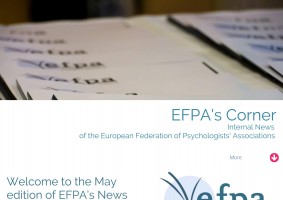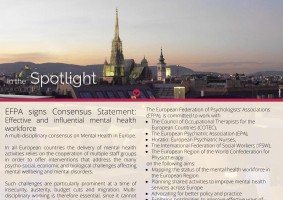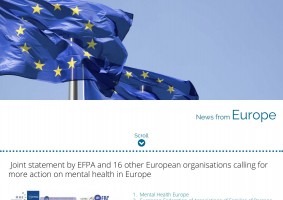Welcome to our May edition which is full of positive news. Let us start with some encouraging news from the EFPA Presidents’ council meeting in Zürich of May.
Our colleagues from the UK will organize the European Semester in the first half of 2018 and the new BPS President Nicola Gale announced closer collaboration with the European colleagues in EFPA.
The German colleagues presented a paper on ‘Data management in Psychological Science’ and the Executive Council announced the signing of a Consensus statement with 6 stakeholders and WHO Europe agreeing on working together ‘towards an effective and influential mental health workforce in Europe’.
While our friends from EAWOP just finished their congress in Dublin - with a nice moment of commemoration of Robert Roe – our Dutch colleagues are in full preparation of the EFPA congress in Amsterdam.
More than 40 events are organized by EFPA groups, there will be different ‘tracks’ during the congress, like the one on ‘Human Rights’, or ‘Ethics’ and ‘Psychology and Health’.
We welcome the EU Commissioner for Health Vytenis Andriukaitis who will speak at the Opening ceremony. Well known experts like Noble Prize winner Edvard Moser and EFPA award winners Dave Bartram, Susan Fiske, David Ebert, the organization CON AMORE and Comenius award winner 2015 Pauline Jansen will give their keynotes. Follow the program on the ECP website and on Facebook.
The next edition of the newsmagazine of end of June will be completely devoted to the European Congress of Psychology, where we will list the most important events and share practical information.
We hope you find this new edition enjoyable and informative.
The editorial board
Follow us
on Facebook
Visit of the EFPA Board Human Rights and Psychology to UN institutes in Geneva
March 17, 2017
The Swiss Psychologists Association, FSP, hosted the Board Human Rights and Psychology, BHR&Psy in the frame of the EFPA European Semester.The BHR&Psy, joined by colleagues of the FSP, met representatives of international organizations located in Geneva, the OHCHR, WHO and IOM.
Twenty colleagues met at first for an informal meeting about the programme of the day and the importance of psychologists for human rights and of human rights for psychology.
more
_w1700_h720_1.jpg)
EFPA Board on "Psychology and Human Rights": Extending Network
The EFPA Board on „Psychology and Human Rights“ – joined by a group of interested FSP members – met with international human rights organisations in Geneva. Having been formed in July 2015, the Board’s main activities are awareness raising and human rights education of psychologists. In these endeavours, the Board has established collaborations with the European Inter-University Centre for Human Rights and Democratisation and the European Union Agency for Fundamental Rights.
more
EFPA Task Force Sport Psychology meeting in Athens
April 21, 2017
At the offices of the Greek Association of Psychologists.
The Greek association of Psychologists kindly hosted the meeting of the TF sport psychology.
The Greek member Maria Psychountaki organised the meeting and a dinner was offered by the president, Vassiliki Boukouvala and the managing council of the association.
EFPA created a Task Force in Sport Psychology in 2011 to collect information on the education, training, supervision, professional practice and organizations in sport psychology in Europe. The Task Force in Sport Psychology was asked to suggest improvements in the education and training of sport psychologists in Europe in collaboration with sport organizations (e.g., European Federation of Sport Psychology, FEPSAC, International Society of Sport Psychology, ISSP). Sport psychology is rapidly expanding as increasing numbers of psychologists are required and employed by sports club, federations, and organizations.
School psychologists present new publication about inclusive educational practice in Europe at ECP 2017 Amsterdam
“Inclusive Educational Practice in Europe: Psychological perspectives” Arnold, C. and Horan, J (Eds) (2017) London: UCL/IoE/Trentham Books.
The EFPA standing committee of Psychologists in Education will present new publication at the ECP Amsterdam, listing a table of key facts relating to inclusion in several European Countries. The movement for inclusive education has a long and honourable history, however there are some profound differences in interpretation in different areas. Few texts explore this and fewer still offer well grounded theories in why such a movement is important.
Practices which lead to segregation of different social groups have been found in every society in every part of history that has been documented. Segregation has many different terms. Examples include: “Exclusion, expulsion, imprisonment, transportation, removal, incarceration, internment, exiling, time out, expatriation, ostracism, banishment, ethnic cleansing, genocide, apartheid and ultimately, execution or capital punishment have been used as methods of social control since records began. “ Arnold et.al. (2009)
We could add special education and non-inclusive schools to that list.
There are references from the earliest records of human communities of healers helping individuals who may be sick. Institutions developed in the early centuries AD to support vulnerable people. Education was extended to people with sensory impairments in special institutions from renaissance times. Education became a right for all in towards the end of the nineteenth century in many parts of the world. Specialisation in assisting vulnerable children became a feature of most educational systems in the twentieth century.
The children for whom we established separate educational systems were not usually suffering from infectious diseases. The disabilities which lead to non-inclusive educational settings are not infectious, although there is still one group of young people for whom the fear of contagion is still apparent. Many education systems have developed provision to segregate young people who initially were included in mainstream schools. Such children became segregated as a response to their challenging behaviour being expressed in schools.
The rise of psychology alongside the development of universal education in the late nineteenth century has been documented elsewhere (see Arnold and Hardy, 2013).
More
Presidents Council Meeting Zürich
May 05, 2017
EFPA Presidents met in Zürich on May 5, 2017 at the occasion of the European Semester organized by Switzerland. On Friday May 5, 2017 about 20 presidents met together with the Executive council in Zürich at the occasion of the European Semester of Psychology which was organized by our Swiss colleagues from the FSP-Fédération Suisse des psychologues.
more
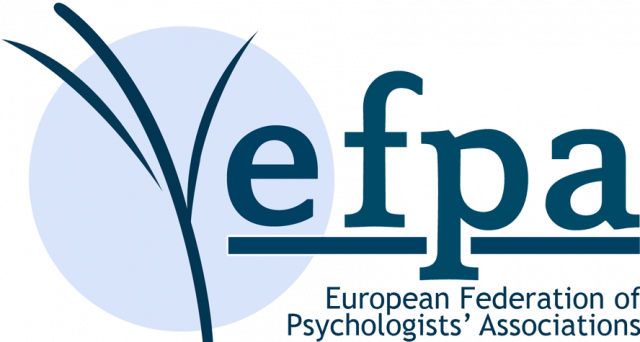
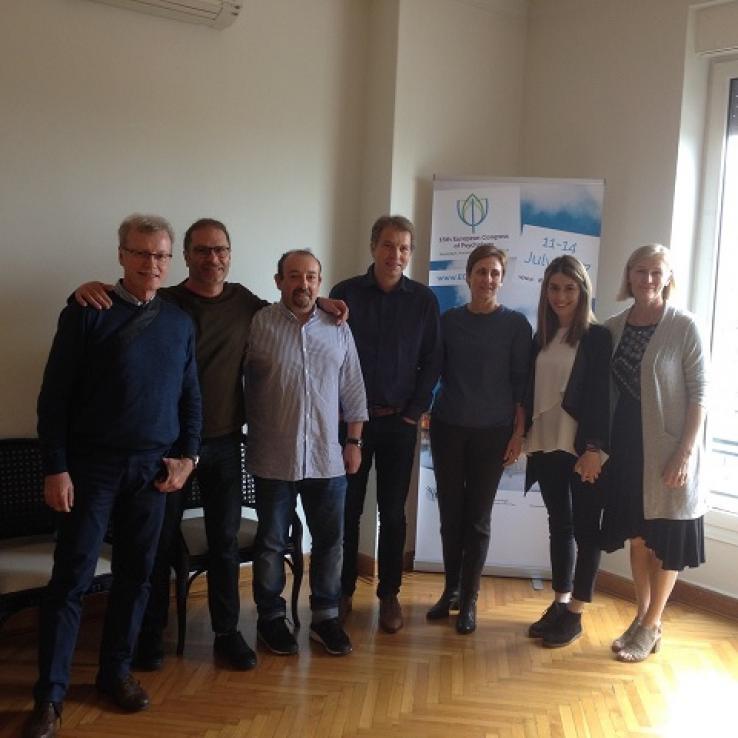
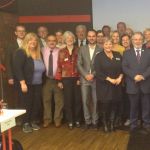



_w150_h150_1.jpg)
_w150_h150_1.jpg)



